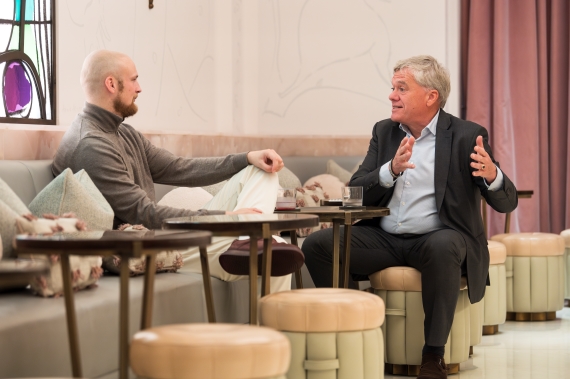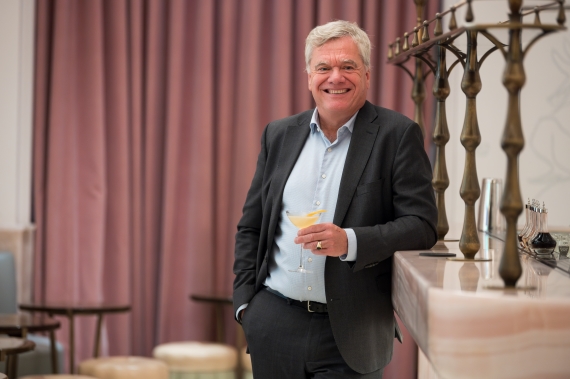De Witte was known to the trade as a gentleman and subtle operator. It’s no surprise that the near 350-year-old, family-owned company opted for a similarly smooth, equable character in Leo Evers to succeed in one of the biggest roles in European spirits.
“It sounds like a cliché, but I like to spend the first 100 days in a new role observing the position and analysing the conditions before beginning to make decisions and implementing our new strategy,” says Evers, in an exclusive interview with Drinks International at The Painter’s Room in London’s Claridges. Evers entered the spirits industry in 1990 at De Kuyper’s rival company Bols, but after spending 30 years in the beer industry with Heineken, the Dutchman gathered a wealth of knowledge in the Asian market having worked with Heineken and Carlsberg in Vietnam, Indonesia, Singapore, Hong Kong and Japan.
“What I like about Asian markets is the growth potential and for sure this will be one of my main targets at De Kuyper,” says Evers. “Peachtree (De Kuyper’s peach liqueur), for example, is performing well in South Korea and Japan and we’re looking to expand the portfolio of De Kuyper liqueurs in these two countries, but we’re also keen to focus on markets like Thailand and Vietnam.”
Evers has spent the opening months of his De Kuyper career visiting the company’s strong markets and meeting its distributors.
“I don’t want to just be an email address to our longstanding partners, so it’s important to meet them in person.
“For the big beer companies they can simply build a brewery in a strong market, but it’s not the same for spirits and liqueurs, which makes the selection and management of a distributor vital for our business.”
BRAND DEVELOPMENT
De Kuyper currently has more than 10 independent brands in its portfolio as well as its own line of liqueurs, syrups, RTDs and local speciality and legacy brands. Its most recent acquisition was Archers, which it bought from Diageo in 2022.
“One of my key strategies will be to focus on our independent brands such as Mandarine Napoléon and Heering because I think they have massive potential. We have a new look for Heering and in Q1, 2025 we will launch a new design for Archers – it’s an area we are investing in significantly.
“It’s true that the wide variety of brands we have is a challenge, but overall the portfolio is performing well. When I first joined the company I assumed the focus would be the super-premium sector, but I think there’s a very nice role to play for the affordable premium space, especially for De Kuyper.
“Some of the main spirits categories and major spirits companies are struggling, but for De Kuyper and liqueurs I think we’re developing quite nicely in comparison. The company is in growth but I think we can improve our operating profit and that’s something we can strive for.”

A key strategy for De Kuyper in the 21st century has been to develop its cocktail programme and in recent years it has launched ready-to-serve varieties in bottle, draught and pre-batched.
“I truly believe in our recently developed RTS range,” says Evers. “I’m enthusiastic about this sector because, as a company, our vision is to own the cocktail, and this format allows us to serve our drinks to a much broader variety of consumer.
“Of course the high-end cocktail bar remains a key strategic point for De Kuyper and we will never forget about them, particularly with constantly changing trends which we need to be involved with.”
INVESTING IN NO/LOW
Another area of investment will be the development of a strong low-abv range of products in the portfolio. “What we’re now hoping to launch in the first half of 2025 is the pre-batched range but in 0.0% format. We need to offer our consumers both options.
“I don’t think anyone has really cracked the low/no sector for spirits, but having tasted our latest products I think we’ll get there.
“What you need to appreciate is that it took beer brands like Heineken around 20 years to nail their 0.0 solution, so spirits and liqueurs were late to the party. But what’s struck me in these first six months is the amount of R&D and innovation taking place.
“This is one of my key focuses beyond expanding our distribution and strengthening our brands – being the first to develop new products and concepts. De Kuyper should be a global leader in this regard. I’ve already encouraged Myriam (Hendrickx, master distiller at De Kuyper) to push hard on innovation.”

In the two hours spent with Evers his laid-back demeanour was infectious, but beneath the surface was a clear, efficient operator with big plans. Infiltrating Asia, developing RTDs and non-alcoholic varieties, investing in legacy brands and advancing innovation while increasing profits sounds like mission impossible to us mere mortals. But Evers’ ambition, combined with his experience and a dash of confidence, breeds a recipe for success.
“I would like to be remembered as a CEO who has written a successful new chapter into the 329-year-old book of De Kuyper, but it’s going to take a huge collaborative effort from everyone involved.”




